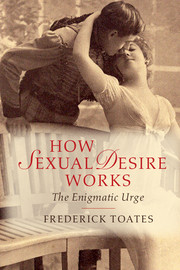Book contents
- Frontmatter
- Dedication
- Contents
- List of figures
- Preface
- One What is enigmatic about sexual desire?
- Two Explaining desire: multiple perspectives
- Three Sexual desire in a broad context
- Four An incentive-based model
- Five Sex and levels of organization
- Six Sexual attraction
- Seven Shades of desire from simple to complex
- Eight Details of the brain and desire
- Nine Arousal
- Ten The consequences of sexual behaviour and associated expectations
- Eleven Sexual familiarity and novelty
- Twelve Inhibition, conflict and temptation
- Thirteen How did sexual desire get here?
- Fourteen Setting the trajectory: link to adult sexuality
- Fifteen Sexual desire in interaction
- Sixteen Representations of sex
- Seventeen Sexual addiction
- Eighteen Variations in desire: general principles
- Nineteen Some forms of desire at the fringes
- Twenty The toxic fusion: violence and sexual desire
- Twenty one Sexually associated (serial) murder
- Twenty two Concluding remarks
- Notes
- References
- Index
Three - Sexual desire in a broad context
Published online by Cambridge University Press: 05 October 2014
- Frontmatter
- Dedication
- Contents
- List of figures
- Preface
- One What is enigmatic about sexual desire?
- Two Explaining desire: multiple perspectives
- Three Sexual desire in a broad context
- Four An incentive-based model
- Five Sex and levels of organization
- Six Sexual attraction
- Seven Shades of desire from simple to complex
- Eight Details of the brain and desire
- Nine Arousal
- Ten The consequences of sexual behaviour and associated expectations
- Eleven Sexual familiarity and novelty
- Twelve Inhibition, conflict and temptation
- Thirteen How did sexual desire get here?
- Fourteen Setting the trajectory: link to adult sexuality
- Fifteen Sexual desire in interaction
- Sixteen Representations of sex
- Seventeen Sexual addiction
- Eighteen Variations in desire: general principles
- Nineteen Some forms of desire at the fringes
- Twenty The toxic fusion: violence and sexual desire
- Twenty one Sexually associated (serial) murder
- Twenty two Concluding remarks
- Notes
- References
- Index
Summary
The greatest enterprise of the mind has always been and always will be the attempted linkage of the sciences and the humanities.
(Wilson, 1998, p. 6)What is to be explained?
Sexual desire arises within an historical, cultural and religious context, which powerfully influences how it is interpreted (Hawkes, 2004). Assumptions on how desire works are made and assimilated into cultures. Discussion of this issue is much more than armchair philosophy; what is believed about desire tends both to reflect and inform laws, social and religious attitudes, and policy. This chapter cannot give an even remotely comprehensive view of this vast subject. All it can do is give some examples of the various assumptions that surround the nature of desire, show their implications and relate them to a modern interpretation. Throughout history, eminent thinkers have suggested how sexual desire arises and what the consequences are for well-being of either following its call or voluntarily resisting it. The effects of thwarted and frustrated desire have also attracted speculation.
To modern scientifically informed minds, early attempts at explanation can sound comical, but modesty here would not be out of place. In past centuries people were, of course, without any knowledge of evolution, modern anatomical description, neuroimaging and chemical analysis. However, concerning their own desires and behaviour and the behaviour of others, they were probably no less astute observers than we are. Early explanations say much about ubiquitous aspects of the experience and expression of sexual desire.
- Type
- Chapter
- Information
- How Sexual Desire WorksThe Enigmatic Urge, pp. 68 - 94Publisher: Cambridge University PressPrint publication year: 2014



